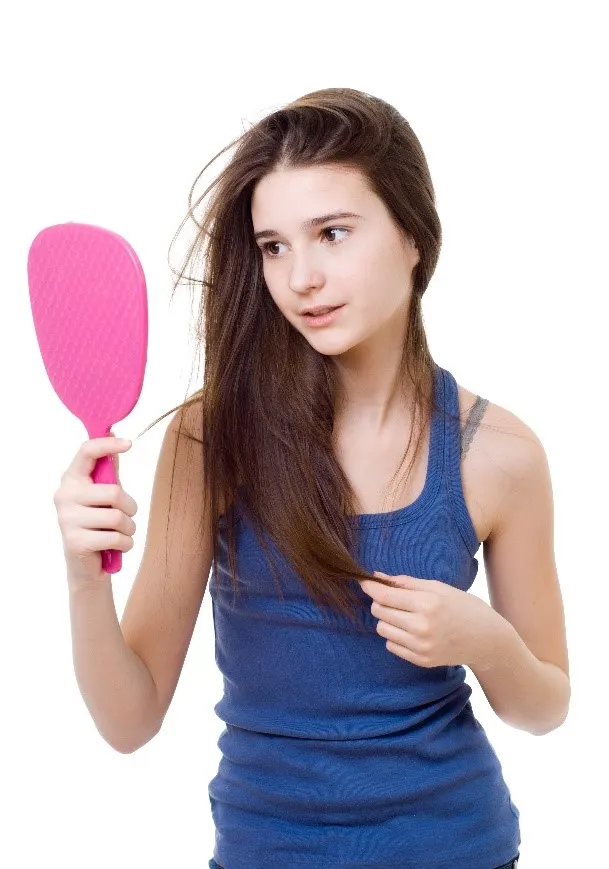IS DANDRUFF NORMAL DURING PUBERTY?
The teenage years are more chaotic then most people would like to admit. Your body changes on a daily basis and you’re left wondering what’s in store for the next month. The whole point of puberty is to transition your body into that of an adult. You might see a spurt of hair growth, you might see a breakout of acne, you might suddenly become taller by a few inches. All of these are caused by a fluctuation of hormones, which is usually the culprit of your dandruff ailment.

Does puberty cause dandruff?
The body secretes hormones that aid in your growth. The tricky part of puberty, and your teenage years, is that the body does not really know how much hormone to secrete. Or even how your body will react. It’s like a game of constant adjustment, with you as the player. But these hormonal fluctuations can trigger your body into producing excess oil, which is often the reason for an acne breakout on your face as well. This excess oil secretion causes dandruff to make an appearance.
But what is dandruff? Dandruff is caused by a fungus known as Malassezia Globosa. This fungus feeds on the oil created by the sebaceous glands on your scalp and breaks it down into Oleic Acid. Almost half of the world is sensitive to this by-product and ends up with severe itching and white flakes, which we know as Dandruff. During puberty, the excess oil that is produced on your scalp allows the fungus to grow exponentially and creates a cycle of dandruff that literally leaves you scratching your head. This should answer your question – is dandruff common in puberty.
It is also important to understand the difference between a dry scalp and dandruff. If your scalp is excessively dry, dead skin cells will start to shed and resemble dandruff flakes. On the other hand, dandruff causes red patches on your scalp, severe itching, and of course the white-yellow flakes. Dry scalp is much easier to manage, but dandruff is a little craftier.
Does dandruff go away after puberty?
Thankfully, dandruff is not a permanent condition. You aren’t going to go through puberty for your entire life. Also, it’s normal to find this fungus on your scalp and is not a cause for concern. You should see a return to normal oil production after a few years itself. Till then, all you need to do is take care of your scalp.
If you don’t take care of your scalp, this dandruff can come back when you’re much older. Your scalp can produce excess oil for various reasons. It can be due to weather changes, harsh chemicals in your hair products, over-washing your hair, stress induced hormonal fluctuations, or just weak hair hygiene. That’s why it is important to understand your scalp problems and how to treat them.
How to treat dandruff
You should feel happy that we live in a time where dandruff solutions are available over the counter. There are home remedies you can use and also store products. The only way to find out what works, is to try them out.
- Neem is nature’s answer to dandruff, providing instant relief from any itchiness and bringing its anti-fungal properties to your rescue. Create a paste and apply it on your hair.
- Lemon can cool your system down if you drink it, but it can work wonders if you apply a diluted version to your hair. It can eliminate excess oil build-up and unclog hair follicles.
- Aloe Vera brings a cooling effect to your scalp, along with enzymes and fatty acids that can reduce scalp irritation. You can apply it directly as a dandruff treatment or create a hair mask out of it.
- Argan oil is an essential oil that is rich in Vitamin E and has anti-inflammatory attributes that can form a protective layer on your scalp. Gently massage a few drops onto your hair and scalp.
- Using a diluted version of Apple Cider Vinegar can clear up any residual products, oil or dirt from your head. You can apply it directly or create a mask with Aloe Vera and honey. But be careful with the quantities.
- Protecting your hair from harsh sunlight, pollution and dirt, can go a long way in preventing your dandruff condition from getting worse.
- A healthy diet with essential vitamins and omega 3 fatty acids, can help counter the fluctuations of your hormones and reduce oil production.
The main way to protect yourself from dandruff is to take care of your hair. Shampoo and condition your hair regularly to get rid of that excess oil and junk, so that you can prevent dandruff from ever appearing. Use the Head and Shoulder Neem shampoo or the Head and Shoulders Lemon Fresh anti dandruff shampoo for teenagers, that brings the wonders of nature to help you get rid of your dandruff. You could also employ the Head and Shoulders Active Protect 2 in 1, which combines a shampoo and conditioner to bring respite to your scalp and hair.
It’s normal to feel worried about how your hair will look when you head to school. But you should take comfort in the fact that this is a temporary problem and a solution exists to help you get past it.



